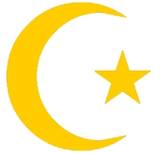The Muslims’ religion and way of life,
spiritually and materially, is Islam. Islam is an Arabic word which means
submission to God. The root of the word Islam comes from a word meaning peace
and it is the way of peace as laid down in the Quran. The word can also mean
submission and it is through submission to God’s will that a Muslim finds
peace. At the heart of Muslim belief is belief in the unity and universality of
God. The Arabic word Allah means the One God. Muslims also believe in the unity
of mankind, under one father, Adam, and have a strong sense of the Muslim
community or Ummah and are aware of their solidarity with all Muslims
worldwide. Muslims recognise the prophets such as Noah, Abraham, Jacob, Moses
and Jesus, and see Mohammed (peace be upon him) as the last and final prophet.
Mohammed was born in Makkah in 570 CE. He received the Holy revelation from God
through the Angel Gabriel over a period of 23 years. This revelation was
recorded in Islam’s Holy Book known as the Quran, which is regarded as the
literal word of God. Muslims are taught to recite the Quran in Arabic as any
translation of the Holy Book is seen as inadequate.
Islam has two principal bases of faith. The first is that there
is no god worthy of worship but the one universal God (Allah), creator and
sustainer of all beings. The second is that Mohammed is his messenger. Islam
has five pillars that represent the foundation stones of Islamic worship and
action: Shahadah: There is no God but the one true God and Mohammed is
his messenger. Reciting this with intention three times makes someone a Muslim.
Salat: Prayer takes place five times a day at given times. It involves a
prescribed sequence of kneeling and standing postures and is made facing
Makkah. Zakat: Two and a half percentage of a Muslim’s assets over
a given specified amount is given in welfare tax to benefit the poor and needy
each year. Hajj: This is an annual pilgrimage to Makkah which takes
place at a fixed time of the calendar. It is a requirement at least once in a
lifetime for those who can afford it. Sawm: During the month of Ramadan,
Muslims are required to abstain from food, drink and sexual acts from dawn
until sunset. The ill, old and travellers are exempt.
Prayer can take place anywhere and often a rug is used to mark
out the place of prayer. The word Mosque means a place of prostration and can
refer to any place of prayer. Purpose built Mosques will be used for communal
prayer, community gatherings, Quranic education and the gathering together for
the traditional Friday mid-day sermon. These Mosques are often characterised by
their dome and minaret, the tall tower from which the call to prayer has
traditionally come. No images representing a living being are allowed in the
Mosque, which could be decorated very artistically using
calligraphy.
|


